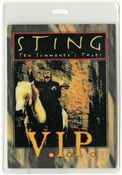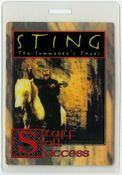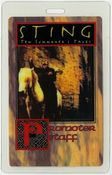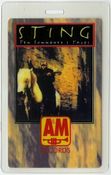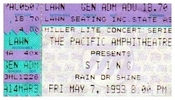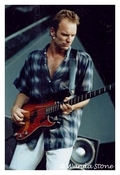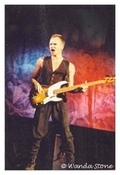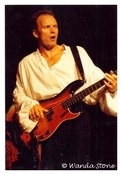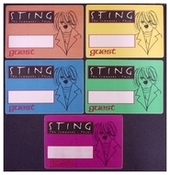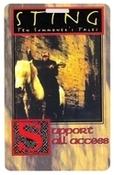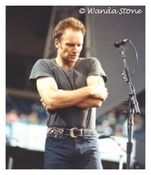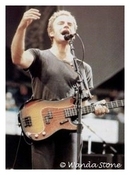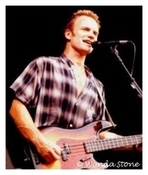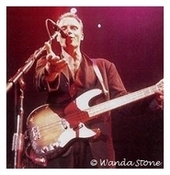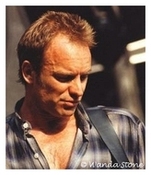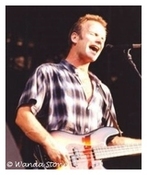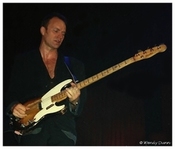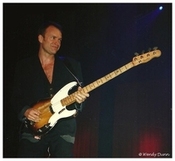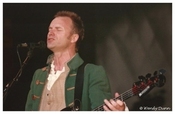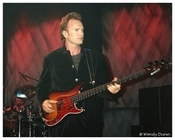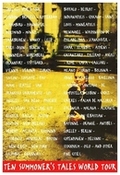
Summoner's Tales
May
7
1993
Costa Mesa, CA, US
Pacific Coast Amphitheater
Sting's straight delivery has crowd on its feet...
Ever wonder what would happen if Sting dropped all the poses he's struck during his solo career and just played it straight?
Friday's packed concert at the Pacific Amphitheatre provided the answer: You'd have an unpretentious, well-paced concert that would go a long way toward explaining the dapper Englishman's broad appeal.
Gone, the pseudo-jazzbo noodler of the mid-1980's 'Dream of the Blue Turtles' era. Goodbye to the preachy troubadour from the later 'Nothing Like the Sun' period. Even the tortured angst of 1991's 'Soul Cages' tour has been banished.
Instead, this year's Sting seemed open, relaxed, and ready to concentrate strictly on music. It helps that his recent 'Ten Summoner's Tales' (A&M), contains some of his most appealingly commercial songs in some time, as he played nearly all of it Friday.
As always, Sting's fluid bass formed the foundation for his excellent quartet of recent years, namely Vinnie Colaiuta on drums, Dominic Miller on lead guitar and David Sancious on keyboards.
The arrangements were kept tightly focused Friday, with few of the meandering instrumental improvisations that Sting has subjected concertgoers to in the past.
Sting's soaring tenor and the band's crisp backing brought the enthusiastic crowd to its feet several times, starting with the set-opening current single 'If I Ever Lose My Faith In You'.
Miller's twangy spaghetti-western guitar made the Wild West mock-epic 'Love Is Stronger Than Justice (The Munificent Seven)' one of the evening's more entertaining numbers.
'Shape of My Heart' and 'Fields of Gold' were the set's prettiest ballads, the latter featuring a warmly romantic Sting vocal laid over the band's pastoral backing.
No Sting concert would be complete without a few Police songs, and he delivered some knockouts Friday. 'Every Little Thing She Does Is Magic' came bursting off the stage, its explosive chorus showcasing the band's precision and drive.
He followed it with the concert's high point, a stunning, hard-rocking 'Roxanne', though a dynamic 'King of Pain' almost matched its energy level a few minutes later.
'Every Breath You Take' sounded a bit perfunctory by comparison, though its obsessive lyrics sound even creepier in an age where it has become necessary to legislate against stalking.
Sting's cover version of The Beatles' 'A Day in the Life' was an audacious choice. He came close to pulling it off, especially during the swollen crescendos following ''I'd love to turn you on,'' but the studio-enhanced song just doesn't quite translate live.
He closed with the delicate acoustic ballad 'Fragile', before taking some well-deserved bows for delivering something of a modern rarity: a thoroughly crowd-pleasing show that was artistically satisfying as well.
The Los Angeles trio Dada opened the show with a 40-minute set long on hammy riffing and hair-flipping and short on originality.
Some of its songs, especially the KROQ hit 'Dizz Knee Land' and 'Dorina', have strong melodic hooks, but the band still felt compelled to end each number with unimaginative riff-a-rama guitar solos.
(c) Daily Breeze by Sam Gnerre
Aborted take-off for Sting...
The frustrating part of it all is that you want to like Sting. You really do.
He's written so many songs that are not just good, but great. Songs such as 'Every Breath You Take' and 'All This Time' are easy calls as highlights of the rock era.
He's revealed so many lyrical insights. He's earnestly supported so many fine causes. He's taken so many chances that could have seriously derailed his career, both with the Police and on his own.
Yet there he was on the Pacific Amphitheatre stage, an arty kerchief jauntily knotted at his neck. There he was, with a foppish white shirt that looked like something out of the Three Musketeers, a shirt that screamed ''I am a sensitive artist!''
There he was, with a haircut that would have made the basis of a good personal-injury suit, looking like an unwitting victim of prank day at the barber shop.
And there he was, taking a concert that could have been a triumph and derailing it every time it tried to take off.
Maybe it's just a self-destructive thing. In a new Rolling Stone interview, Sting admits to using arrogance and pretension as a shield from the world at times. What could have been a soaring triumph Friday night was a patchy, uneven mix of absolute highs strung with dull lulls.
Most performers would be content to hit those highs just a couple of times a show. But Sting can deliver better. His demeanor and some of his more affected songs might not be so hard to swallow were he an unapologetic, arrogant wise guy in the vein of David Lee Roth.
But his pretensions don't sit well with his sensitivity, making for a perfectly fine concert that nonetheless left a slight sour aftertaste.
Then again, image always has been a problem. Even at his best, Sting is misunderstood. Friday night, couples were kissing and cooing at each other during 'Every Breath You Take' as though it were a tender love song instead of the pathological obsessions of a potential stalker.
Sting opened his set the way he did last tour - with his newest hit single. Last time, it was 'All This Time'. This time, it was 'If I Ever Lose My Faith in You'. With soaring vocals, dark but hopeful verses and a universal appeal, the song epitomizes all that is good in the world of Sting.
Then he went into 'Love Is Stronger Than Justice' with its wonderful, catchy chorus dropped into one of Sting's stupidest songs - seemingly only for the juxtaposition in the song's self-consciously quirky arrangement.
But Sting quickly killed a lot of his own momentum by performing too many marathon versions of his new songs in a row - then unleashing a blockbuster one-two-three punch such as
'Synchronicity' into 'Every Little Thing She Does (Is Magic)' into 'Roxanne'. The recent 'It's Probably Me' kept that particular streak going, but the set quickly slid into a self-indulgent abyss again.
It all comes down to pacing. (Here's a hint, sport: See when everyone's standing and cheering? You're doing fine. See when they're sitting looking bored? You're not).
Yet when Sting pushed himself, the moments were more than memorable. Sure, U2 covers the Beatles' 'Helter Skelter' and 'Help', but who else but Sting would have the audacity to attempt to faithfully re-create 'A Day in the Life' onstage with just a four-piece band? And moreover, make it work? While ham-fisted at times, Sting and band turned in a more than competent version, much the way they claimed Jimi Hendrix's 'Purple Haze' for their own on the last tour.
Then again, this is a man who can take a song about death, last rites and the collapse of the Roman Empire and turn it into the poppy hit single 'All This Time'.
The band, as usual, was tight, but the arrangements of the newer songs gave a bloated feel to the music at times, a contrast to last tour's stripped-down rock feel. But older material, solo and Police, fared well. 'King of Pain' was overly long but understated. 'Synchronicity II' was delivered in a taut, cracklingly hot version that injected dementia into the song's lyrics of white-knuckled suburban angst.
Guitarist Dominic Miller wasn't much of a force, merely re-creating a lot of Andy Summers guitar lines. Keyboard player David Sancious shone, especially during his keyboard attack during 'When the World Is Running Down You Make the Best of What's Still Around'.
Starting stiff but not intimidated by the size of the venue, dada knew all the tricks of pacing that elude Sting. With a 40-minute set bookended by its two best songs, 'Dim' and 'Dizz Knee Land', the band got the crowd enthused enough that there was genuine interest even in its slighter efforts, such as the too-long 'Here Today, Gone Tomorrow'.
The bass-heavy sound actually helped the trio, with Joie Calio's four-string soloing coming through with punchy clarity. Guitarist Michael Gurley was magnificent, cramming even more notes into the already busy solo on 'Dim' and other rockers. Gurley knows every lick from George Clinton funk to Keith Richards stutter-step howls and doesn't hesitate to use them - maybe a little too often.
Gurley, however, too often played to the front row rather than the back, making it a great gig for those up front and an interesting spectacle to look in on from the lawn.
Still, dada can use this tour as a showcase to draw thousands of new fans. If the group keeps performing like it did Friday night, that's just what will happen.
(c) The Orange County Register by Mark Brown
Sting is his own worst enemy...
Sting's Friday night concert at the Pacific Amphitheatre could have been a triumph, but the performer derailed it every time it tried to take off.
The frustrating part of it all is that you want to like Sting. You really do.
He's written so many songs that are not just good, but great. Songs such as 'Every Breath You Take' and 'All This Time' are easy calls as highlights of the rock era. He's revealed so many lyrical insights. He's earnestly supported so many fine causes. He's taken so many chances that could have seriously derailed his career, both with the Police and on his own.
Yet there he was on the Pacific Amphitheatre stage, an arty kerchief jauntily knotted at his neck. There he was, with a foppish white shirt that looked like something out of the Three Musketeers, a shirt that screamed ''I am a sensitive artist!''
There he was, with a haircut that would have made the basis of a good personal-injury suit, looking like an unwitting victim of prank day at the barber shop. And there he was, taking a concert that could have been a triumph and derailing it every time it tried to take off.
Maybe it's just a self-destructive thing. In a new Rolling Stone interview, Sting admits to using arrogance and pretension as a shield from the world at times. What could have been a soaring triumph Friday night was a patchy, uneven mix of absolute highs strung with dull lulls. Most performers would be content to hit those highs just a couple of times a show. But Sting can deliver better. His demeanour and some of his more affected songs might not be so hard to swallow were he an unapologetic, arrogant wise guy in the vein of David Lee Roth.
But his pretensions don't sit well with his sensitivity, making for a perfectly fine concert that nonetheless left a slight sour aftertaste. Then again, image always has been a problem. Even at his best, Sting is misunderstood. Friday night, couples were kissing and cooing at each other during 'Every Breath You Take' as though it were a tender love song instead of the pathological obsessions of a potential stalker.
Sting opened his set the way he did last tour - with his newest hit single. Last time, it was 'All This Time'. This time, it was 'If I Ever Lose My Faith in You'. With soaring vocals, dark but hopeful verses and a universal appeal, the song epitomizes all that is good in the world of Sting. Then he went into 'Love Is Stronger Than Justice' with its wonderful, catchy chorus dropped into one of Sting's stupidest songs - seemingly only for the juxtaposition in the song's self-consciously quirky arrangement.
But Sting quickly killed a lot of his own momentum by performing too many marathon versions of his new songs in a row - then unleashing a blockbuster one-two-three punch such as 'Synchronicity' into 'Every Little Thing She Does (Is Magic)' into 'Roxanne'. The recent It's Probably Me kept that particular streak going, but the set quickly slid into a self-indulgent abyss again.
It all comes down to pacing. (Here's a hint, sport: See when everyone's standing and cheering? You're doing fine. See when they're sitting looking bored? You're not). Yet when Sting pushed himself, the moments were more than memorable. Sure, U2 covers the Beatles' 'Helter Skelter' and 'Help', but who else but Sting would have the audacity to attempt to faithfully re-create 'A Day in the Life' onstage with just a four-piece band? And moreover, make it work? While ham-fisted at times, Sting and band turned in a more than competent version, much the way they claimed Jimi Hendrix's 'Purple Haze' for their own on the last tour.
Then again, this is a man who can take a song about death, last rites and the collapse of the Roman Empire and turn it into the poppy hit single 'All This Time'. The band, as usual, was tight, but the arrangements of the newer songs gave a bloated feel to the music at times, a contrast to last tour's stripped-down rock feel. But older material, solo and Police, fared well. King of Pain was overly long but understated. 'Synchronicity II' was delivered in a taut, cracklingly hot version that injected dementia into the song's lyrics of white-knuckled suburban angst.
Guitarist Dominic Miller wasn't much of a force, merely re-creating a lot of Andy Summers guitar lines. Keyboard player David Sancious shone, especially during his keyboard attack during 'When the World Is Running Down You Make the Best of What's Still Around'.
Starting stiff but not intimidated by the size of the venue, dada knew all the tricks of pacing that elude Sting. With a 40-minute set bookended by its two best songs, 'Dim' and 'Dizz Knee Land', the band got the crowd enthused enough that there was genuine interest even in its slighter efforts, such as the too-long 'Here Today, Gone Tomorrow'. The bass-heavy sound actually helped the trio, with Joie Calio's four-string soloing coming through with punchy clarity. Guitarist Michael Gurley was magnificent, cramming even more notes into the already busy solo on 'Dim' and other rockers. Gurley knows every lick from George Clinton funk to Keith Richards stutter-step howls and doesn't hesitate to use them - maybe a little too often. Gurley, however, too often played to the front row rather than the back, making it a great gig for those up front and an interesting spectacle to look in on from the lawn. Still, dada can use this tour as a showcase to draw thousands of new fans. If the group keeps performing like it did Friday night, that's just what will happen.
(c) The Orange County Register by Mark Brown
Sting's bite is mild at best...
What's Sting without an agenda?
Since he split from the Police, the English star's music has always had a subtext of some sort. There have been stylistic agendas - especially the fusion of pop and jazz on his 1985 solo debut, 'The Dream of the Blue Turtles'.
There have also been thematic ones - the social commentary sprinkled through 'Blue Turtles' and '...Nothing Like the Sun', and the deeply personal reckoning with his father's death and an attendant spiritual crisis that informed Sting's best album, 'The Soul Cages'.
With his new album, 'Ten Summoner's Tales', he shuns politics and for the most part takes a break from inward probing. Instead, he offers alternately wry and fervent reflections on love, and jaundiced commentary on what it's like to be a much-scrutinised public personage - a topic tiresome to all but the celebrity-fuelled media and its darlings. Not much material there for agenda-building.
So what a near-capacity house at the Pacific Amphitheatre got Friday night was Sting sans agenda: a serviceable trouper (looking dashingly Byronic in a long coat and billowy white shirt), a willing and energetic crowd-pleaser who provided a moderately entertaining but rarely memorable night out.
The audience, or at least those in the orchestra, also got nearly two hours of free scalp massage, thanks to a harsh, rumbling sound mix in which the amplification on Vinnie Colaiuta's bass drum was ideal if you wanted your hair-roots tickled, but terribly obtrusive if you came expecting a deft execution of Sting's polished, urbane fusion of jazz, pop, rock and R&B.
David Sancious, a veteran of Peter Gabriel's band and an original (if short-term) member of Bruce Springsteen's E-Street Band, was able to emerge from the murk with some lively jazz-piano excursions; guitarist Dominic Miller got the worst of the mix and, save for his empathetic semi-acoustic guitar accompaniments on quieter songs, didn't do much beyond generic hard-rock whanging when the murk parted for him.
Sting was in good voice, bopped around the stage quite a bit and kept the crowd alive with danceable grooves and a six-song helping of classic-rock staples from the Police. Stringing together 'Synchronicity II', 'Every Little Thing She Does Is Magic' and 'Roxanne', as he did in one mid-set sequence, is one sure way to get a rise out of an audience.
In a surprise dip into the past, Sting also delivered a faithful rendition of the Beatles' 'A Day in the Life', with the elaborate orchestrations replicated via digital technology (on that score, Karl Wallinger of World Party beat Sting to the punch six years ago, when he and his band performed the John Lennon song verbatim on their first U.S. tour). But in playing 10 of the 11 'Summoner's Tales', Sting could hardly be accused of excessive nostalgia.
While emphasising the new and the festive, Sting ignored the brooding 'Soul Cages' material and set aside any hint of social crusading, either between or during songs. His stage patter involved only routine pleasantries and a joking account of how the languid, backhandedly affectionate 'It's Probably Me' came into being because he was commissioned to write a ''buddy song'' for the film 'Lethal Weapon 3'.
The show's best moments were its quiet departures from form: 'Fields of Gold' was a simply eloquent love song that borrows from traditional British folk-balladry. The closing encore, 'Fragile', found Sting plucking delicately on a Spanish guitar to bring the evening to a muted, reflective finish.
It may have been an unintended coincidence, but this light evening's entertainment ended with songs that could be taken as reflections on a horrible day in the life of Orange County.
In what was probably just a bit of standard, crowd-pleasing show business, Sting capped his first encore with a brisk version of the Police's biggest hit, 'Every Breath You Take'. On a day when the papers were filled with details of a murderous spree by an alleged romantically obsessed stalker, the song hit home with its portrayal of a man driven to shadow the woman who has rejected him.
Sting waved a happy goodbye, then returned for one more song: 'Fragile', a sombre meditation on the tragic reign of violence. He didn't say anything about the day's happenings, but when a song is good and holds some truth, it can resonate in ways the performer doesn't necessarily intend.
Dada, the Los Angeles band that had impressed as a headliner last December at the Coach House, comfortably made the adjustment to the big stage in its 40-minute opening set. The pop-rock trio played with authority, skill and clarity, offering an assortment of pleasures that included hook-filled songs, sharp tandem vocals and Michael Gurley's controlled flash on guitar.
(c) The Los Angeles Times by Mike Boehm
Sting stung by new material...
As an occasional screen actor, Sting wrestled with inner and outer demons in 1982's 'Brimstone and Treacle' and 1985's 'Frankenstein', and battled otherworldy forces in the 1984 science-fiction flick, Dune'.
But at the Pacific Amphitheatre Friday night, the English pop superstar confronted what may be his most daunting adversary yet - a nearly 18,000-strong mass of seemingly ordinary fans that was quickly transformed into, gulp, ''The Audience With Two Heads.'' Although benign in appearance, the maddeningly schizophrenic actions of this Orange County-bred behemoth posed a formidable challenge for Sting that he was unable to overcome in his 20-song, 105-minute concert.
To wit: Whenever he performed any material from his late '70s, early '80s heyday with the Police, or from the early part of his post-Police solo career, ''The Audience With Two Heads'' would cheer, leap to its feet and dance.
But, with the exception of his opening number and recent single (If I Ever Lose My Faith In You) and first encore (the boogie-happy 'She's Too Good For Me'), whenever he performed any material from his newest album, 'Ten Summoner's Tales', ''The Audience With Two Heads'' would sit down and, often as not, begin conversing.
This stand up-sit down/listen-talk response to Sting's old and new work suggested a spontaneous demonstration of Pavlov's famed theory of conditioned reactions set to music. Worse, given the reportedly similar response to Sting's four previous shows on his current North American tour, ''The Audience With Two Heads''-phenomenon could follow him from city to city. Of course, it's not uncommon for fans to greet an artist's older, more familiar material with greater enthusiasm than they accord to unfamiliar new work.
But on Sting's 1991 tour to promote his previous album, 'The Soul Cages', fans listened thoughtfully to his then-latest batch of songs in each of the three cities where this observer saw him perform. The difference? While clearly more challenging, Sting's deeply introspective exploration of the death of his parents and his struggle for personal fulfilment in the songs from 'The Soul Cages' resulted in music far richer and emotionally satisfying than the lighter, mostly style-over-substance songs from 'Ten Summoner's Tales'.
Sting has acknowledged his new album was designed merely to, in his words, amuse and entertain. So it's no surprise that his Costa Mesa audience reacted only politely to most of the pleasant but mild songs from 'Ten Summoner's Tales', while loudly welcoming his more rewarding earlier work. (Mysteriously, he didn't perform even one song from 'The Soul Cages'.)
Not coincidentally, Sting and his crack trio - keyboardist David Sancious, drummer Vinnie Colaiuta and guitarist Dominic Miller - generally injected far more passion into his earlier works than the polished, professional but mostly unessential songs from 'Ten Summoner's Tales'. It was almost a tacit concession that his newest work offers him the same lack of depth as it does his fans.
Attired in a billowy white shirt, black tails and dark pants and boots, his receding hair closely cropped, Sting sang well and played bass with authority throughout. On 'Heavy Cloud No Rain' he performed thumb-popping funk licks, while 'Love Is Stronger Than Justice (The Munificent Seven)' found him alternating between a sleek fusion-jazz riff in 7/4 time and a 3/4 country-waltz chorus that would do most Nashville tunesmiths proud.
He faltered with a note-perfect version of The Beatles' 'A Day in the Life', a classic to which he added nothing. And two of the best songs from his new album, the lovely, acoustic guitar-led ballads 'Fields of Gold' and 'Shape Of My Heart', did not fare well in the massive amphitheater, which swallowed up their nuances.
The show kicked into high gear with three Police songs, 'Synchronicity II', 'Every Little Thing She Does Is Magic' and an extended version of the 1978 breakthrough single, 'Roxanne'.
But then, just as it seemed ''The Audience With Two Heads'' was ready to dance both of them off, Sting turned back to his new album and the pandemonium temporarily subsided - until the next batch of oldies.
Sting and his band sounded most inspired on a lengthy version of 'When The World Is Running You Down', which featured a charged, jazz-gospel piano solo by Sancious, and should go over especially well when Sting opens for the Grateful Dead Thursday and Friday in Las Vegas.
The concert opened with an impressive set by dada, the snappy rock trio that performs a free show Thursday at the Belly Up Tavern in Solana Beach.
(c) The San Diego Tribune by George Varga
Ever wonder what would happen if Sting dropped all the poses he's struck during his solo career and just played it straight?
Friday's packed concert at the Pacific Amphitheatre provided the answer: You'd have an unpretentious, well-paced concert that would go a long way toward explaining the dapper Englishman's broad appeal.
Gone, the pseudo-jazzbo noodler of the mid-1980's 'Dream of the Blue Turtles' era. Goodbye to the preachy troubadour from the later 'Nothing Like the Sun' period. Even the tortured angst of 1991's 'Soul Cages' tour has been banished.
Instead, this year's Sting seemed open, relaxed, and ready to concentrate strictly on music. It helps that his recent 'Ten Summoner's Tales' (A&M), contains some of his most appealingly commercial songs in some time, as he played nearly all of it Friday.
As always, Sting's fluid bass formed the foundation for his excellent quartet of recent years, namely Vinnie Colaiuta on drums, Dominic Miller on lead guitar and David Sancious on keyboards.
The arrangements were kept tightly focused Friday, with few of the meandering instrumental improvisations that Sting has subjected concertgoers to in the past.
Sting's soaring tenor and the band's crisp backing brought the enthusiastic crowd to its feet several times, starting with the set-opening current single 'If I Ever Lose My Faith In You'.
Miller's twangy spaghetti-western guitar made the Wild West mock-epic 'Love Is Stronger Than Justice (The Munificent Seven)' one of the evening's more entertaining numbers.
'Shape of My Heart' and 'Fields of Gold' were the set's prettiest ballads, the latter featuring a warmly romantic Sting vocal laid over the band's pastoral backing.
No Sting concert would be complete without a few Police songs, and he delivered some knockouts Friday. 'Every Little Thing She Does Is Magic' came bursting off the stage, its explosive chorus showcasing the band's precision and drive.
He followed it with the concert's high point, a stunning, hard-rocking 'Roxanne', though a dynamic 'King of Pain' almost matched its energy level a few minutes later.
'Every Breath You Take' sounded a bit perfunctory by comparison, though its obsessive lyrics sound even creepier in an age where it has become necessary to legislate against stalking.
Sting's cover version of The Beatles' 'A Day in the Life' was an audacious choice. He came close to pulling it off, especially during the swollen crescendos following ''I'd love to turn you on,'' but the studio-enhanced song just doesn't quite translate live.
He closed with the delicate acoustic ballad 'Fragile', before taking some well-deserved bows for delivering something of a modern rarity: a thoroughly crowd-pleasing show that was artistically satisfying as well.
The Los Angeles trio Dada opened the show with a 40-minute set long on hammy riffing and hair-flipping and short on originality.
Some of its songs, especially the KROQ hit 'Dizz Knee Land' and 'Dorina', have strong melodic hooks, but the band still felt compelled to end each number with unimaginative riff-a-rama guitar solos.
(c) Daily Breeze by Sam Gnerre
Aborted take-off for Sting...
The frustrating part of it all is that you want to like Sting. You really do.
He's written so many songs that are not just good, but great. Songs such as 'Every Breath You Take' and 'All This Time' are easy calls as highlights of the rock era.
He's revealed so many lyrical insights. He's earnestly supported so many fine causes. He's taken so many chances that could have seriously derailed his career, both with the Police and on his own.
Yet there he was on the Pacific Amphitheatre stage, an arty kerchief jauntily knotted at his neck. There he was, with a foppish white shirt that looked like something out of the Three Musketeers, a shirt that screamed ''I am a sensitive artist!''
There he was, with a haircut that would have made the basis of a good personal-injury suit, looking like an unwitting victim of prank day at the barber shop.
And there he was, taking a concert that could have been a triumph and derailing it every time it tried to take off.
Maybe it's just a self-destructive thing. In a new Rolling Stone interview, Sting admits to using arrogance and pretension as a shield from the world at times. What could have been a soaring triumph Friday night was a patchy, uneven mix of absolute highs strung with dull lulls.
Most performers would be content to hit those highs just a couple of times a show. But Sting can deliver better. His demeanor and some of his more affected songs might not be so hard to swallow were he an unapologetic, arrogant wise guy in the vein of David Lee Roth.
But his pretensions don't sit well with his sensitivity, making for a perfectly fine concert that nonetheless left a slight sour aftertaste.
Then again, image always has been a problem. Even at his best, Sting is misunderstood. Friday night, couples were kissing and cooing at each other during 'Every Breath You Take' as though it were a tender love song instead of the pathological obsessions of a potential stalker.
Sting opened his set the way he did last tour - with his newest hit single. Last time, it was 'All This Time'. This time, it was 'If I Ever Lose My Faith in You'. With soaring vocals, dark but hopeful verses and a universal appeal, the song epitomizes all that is good in the world of Sting.
Then he went into 'Love Is Stronger Than Justice' with its wonderful, catchy chorus dropped into one of Sting's stupidest songs - seemingly only for the juxtaposition in the song's self-consciously quirky arrangement.
But Sting quickly killed a lot of his own momentum by performing too many marathon versions of his new songs in a row - then unleashing a blockbuster one-two-three punch such as
'Synchronicity' into 'Every Little Thing She Does (Is Magic)' into 'Roxanne'. The recent 'It's Probably Me' kept that particular streak going, but the set quickly slid into a self-indulgent abyss again.
It all comes down to pacing. (Here's a hint, sport: See when everyone's standing and cheering? You're doing fine. See when they're sitting looking bored? You're not).
Yet when Sting pushed himself, the moments were more than memorable. Sure, U2 covers the Beatles' 'Helter Skelter' and 'Help', but who else but Sting would have the audacity to attempt to faithfully re-create 'A Day in the Life' onstage with just a four-piece band? And moreover, make it work? While ham-fisted at times, Sting and band turned in a more than competent version, much the way they claimed Jimi Hendrix's 'Purple Haze' for their own on the last tour.
Then again, this is a man who can take a song about death, last rites and the collapse of the Roman Empire and turn it into the poppy hit single 'All This Time'.
The band, as usual, was tight, but the arrangements of the newer songs gave a bloated feel to the music at times, a contrast to last tour's stripped-down rock feel. But older material, solo and Police, fared well. 'King of Pain' was overly long but understated. 'Synchronicity II' was delivered in a taut, cracklingly hot version that injected dementia into the song's lyrics of white-knuckled suburban angst.
Guitarist Dominic Miller wasn't much of a force, merely re-creating a lot of Andy Summers guitar lines. Keyboard player David Sancious shone, especially during his keyboard attack during 'When the World Is Running Down You Make the Best of What's Still Around'.
Starting stiff but not intimidated by the size of the venue, dada knew all the tricks of pacing that elude Sting. With a 40-minute set bookended by its two best songs, 'Dim' and 'Dizz Knee Land', the band got the crowd enthused enough that there was genuine interest even in its slighter efforts, such as the too-long 'Here Today, Gone Tomorrow'.
The bass-heavy sound actually helped the trio, with Joie Calio's four-string soloing coming through with punchy clarity. Guitarist Michael Gurley was magnificent, cramming even more notes into the already busy solo on 'Dim' and other rockers. Gurley knows every lick from George Clinton funk to Keith Richards stutter-step howls and doesn't hesitate to use them - maybe a little too often.
Gurley, however, too often played to the front row rather than the back, making it a great gig for those up front and an interesting spectacle to look in on from the lawn.
Still, dada can use this tour as a showcase to draw thousands of new fans. If the group keeps performing like it did Friday night, that's just what will happen.
(c) The Orange County Register by Mark Brown
Sting is his own worst enemy...
Sting's Friday night concert at the Pacific Amphitheatre could have been a triumph, but the performer derailed it every time it tried to take off.
The frustrating part of it all is that you want to like Sting. You really do.
He's written so many songs that are not just good, but great. Songs such as 'Every Breath You Take' and 'All This Time' are easy calls as highlights of the rock era. He's revealed so many lyrical insights. He's earnestly supported so many fine causes. He's taken so many chances that could have seriously derailed his career, both with the Police and on his own.
Yet there he was on the Pacific Amphitheatre stage, an arty kerchief jauntily knotted at his neck. There he was, with a foppish white shirt that looked like something out of the Three Musketeers, a shirt that screamed ''I am a sensitive artist!''
There he was, with a haircut that would have made the basis of a good personal-injury suit, looking like an unwitting victim of prank day at the barber shop. And there he was, taking a concert that could have been a triumph and derailing it every time it tried to take off.
Maybe it's just a self-destructive thing. In a new Rolling Stone interview, Sting admits to using arrogance and pretension as a shield from the world at times. What could have been a soaring triumph Friday night was a patchy, uneven mix of absolute highs strung with dull lulls. Most performers would be content to hit those highs just a couple of times a show. But Sting can deliver better. His demeanour and some of his more affected songs might not be so hard to swallow were he an unapologetic, arrogant wise guy in the vein of David Lee Roth.
But his pretensions don't sit well with his sensitivity, making for a perfectly fine concert that nonetheless left a slight sour aftertaste. Then again, image always has been a problem. Even at his best, Sting is misunderstood. Friday night, couples were kissing and cooing at each other during 'Every Breath You Take' as though it were a tender love song instead of the pathological obsessions of a potential stalker.
Sting opened his set the way he did last tour - with his newest hit single. Last time, it was 'All This Time'. This time, it was 'If I Ever Lose My Faith in You'. With soaring vocals, dark but hopeful verses and a universal appeal, the song epitomizes all that is good in the world of Sting. Then he went into 'Love Is Stronger Than Justice' with its wonderful, catchy chorus dropped into one of Sting's stupidest songs - seemingly only for the juxtaposition in the song's self-consciously quirky arrangement.
But Sting quickly killed a lot of his own momentum by performing too many marathon versions of his new songs in a row - then unleashing a blockbuster one-two-three punch such as 'Synchronicity' into 'Every Little Thing She Does (Is Magic)' into 'Roxanne'. The recent It's Probably Me kept that particular streak going, but the set quickly slid into a self-indulgent abyss again.
It all comes down to pacing. (Here's a hint, sport: See when everyone's standing and cheering? You're doing fine. See when they're sitting looking bored? You're not). Yet when Sting pushed himself, the moments were more than memorable. Sure, U2 covers the Beatles' 'Helter Skelter' and 'Help', but who else but Sting would have the audacity to attempt to faithfully re-create 'A Day in the Life' onstage with just a four-piece band? And moreover, make it work? While ham-fisted at times, Sting and band turned in a more than competent version, much the way they claimed Jimi Hendrix's 'Purple Haze' for their own on the last tour.
Then again, this is a man who can take a song about death, last rites and the collapse of the Roman Empire and turn it into the poppy hit single 'All This Time'. The band, as usual, was tight, but the arrangements of the newer songs gave a bloated feel to the music at times, a contrast to last tour's stripped-down rock feel. But older material, solo and Police, fared well. King of Pain was overly long but understated. 'Synchronicity II' was delivered in a taut, cracklingly hot version that injected dementia into the song's lyrics of white-knuckled suburban angst.
Guitarist Dominic Miller wasn't much of a force, merely re-creating a lot of Andy Summers guitar lines. Keyboard player David Sancious shone, especially during his keyboard attack during 'When the World Is Running Down You Make the Best of What's Still Around'.
Starting stiff but not intimidated by the size of the venue, dada knew all the tricks of pacing that elude Sting. With a 40-minute set bookended by its two best songs, 'Dim' and 'Dizz Knee Land', the band got the crowd enthused enough that there was genuine interest even in its slighter efforts, such as the too-long 'Here Today, Gone Tomorrow'. The bass-heavy sound actually helped the trio, with Joie Calio's four-string soloing coming through with punchy clarity. Guitarist Michael Gurley was magnificent, cramming even more notes into the already busy solo on 'Dim' and other rockers. Gurley knows every lick from George Clinton funk to Keith Richards stutter-step howls and doesn't hesitate to use them - maybe a little too often. Gurley, however, too often played to the front row rather than the back, making it a great gig for those up front and an interesting spectacle to look in on from the lawn. Still, dada can use this tour as a showcase to draw thousands of new fans. If the group keeps performing like it did Friday night, that's just what will happen.
(c) The Orange County Register by Mark Brown
Sting's bite is mild at best...
What's Sting without an agenda?
Since he split from the Police, the English star's music has always had a subtext of some sort. There have been stylistic agendas - especially the fusion of pop and jazz on his 1985 solo debut, 'The Dream of the Blue Turtles'.
There have also been thematic ones - the social commentary sprinkled through 'Blue Turtles' and '...Nothing Like the Sun', and the deeply personal reckoning with his father's death and an attendant spiritual crisis that informed Sting's best album, 'The Soul Cages'.
With his new album, 'Ten Summoner's Tales', he shuns politics and for the most part takes a break from inward probing. Instead, he offers alternately wry and fervent reflections on love, and jaundiced commentary on what it's like to be a much-scrutinised public personage - a topic tiresome to all but the celebrity-fuelled media and its darlings. Not much material there for agenda-building.
So what a near-capacity house at the Pacific Amphitheatre got Friday night was Sting sans agenda: a serviceable trouper (looking dashingly Byronic in a long coat and billowy white shirt), a willing and energetic crowd-pleaser who provided a moderately entertaining but rarely memorable night out.
The audience, or at least those in the orchestra, also got nearly two hours of free scalp massage, thanks to a harsh, rumbling sound mix in which the amplification on Vinnie Colaiuta's bass drum was ideal if you wanted your hair-roots tickled, but terribly obtrusive if you came expecting a deft execution of Sting's polished, urbane fusion of jazz, pop, rock and R&B.
David Sancious, a veteran of Peter Gabriel's band and an original (if short-term) member of Bruce Springsteen's E-Street Band, was able to emerge from the murk with some lively jazz-piano excursions; guitarist Dominic Miller got the worst of the mix and, save for his empathetic semi-acoustic guitar accompaniments on quieter songs, didn't do much beyond generic hard-rock whanging when the murk parted for him.
Sting was in good voice, bopped around the stage quite a bit and kept the crowd alive with danceable grooves and a six-song helping of classic-rock staples from the Police. Stringing together 'Synchronicity II', 'Every Little Thing She Does Is Magic' and 'Roxanne', as he did in one mid-set sequence, is one sure way to get a rise out of an audience.
In a surprise dip into the past, Sting also delivered a faithful rendition of the Beatles' 'A Day in the Life', with the elaborate orchestrations replicated via digital technology (on that score, Karl Wallinger of World Party beat Sting to the punch six years ago, when he and his band performed the John Lennon song verbatim on their first U.S. tour). But in playing 10 of the 11 'Summoner's Tales', Sting could hardly be accused of excessive nostalgia.
While emphasising the new and the festive, Sting ignored the brooding 'Soul Cages' material and set aside any hint of social crusading, either between or during songs. His stage patter involved only routine pleasantries and a joking account of how the languid, backhandedly affectionate 'It's Probably Me' came into being because he was commissioned to write a ''buddy song'' for the film 'Lethal Weapon 3'.
The show's best moments were its quiet departures from form: 'Fields of Gold' was a simply eloquent love song that borrows from traditional British folk-balladry. The closing encore, 'Fragile', found Sting plucking delicately on a Spanish guitar to bring the evening to a muted, reflective finish.
It may have been an unintended coincidence, but this light evening's entertainment ended with songs that could be taken as reflections on a horrible day in the life of Orange County.
In what was probably just a bit of standard, crowd-pleasing show business, Sting capped his first encore with a brisk version of the Police's biggest hit, 'Every Breath You Take'. On a day when the papers were filled with details of a murderous spree by an alleged romantically obsessed stalker, the song hit home with its portrayal of a man driven to shadow the woman who has rejected him.
Sting waved a happy goodbye, then returned for one more song: 'Fragile', a sombre meditation on the tragic reign of violence. He didn't say anything about the day's happenings, but when a song is good and holds some truth, it can resonate in ways the performer doesn't necessarily intend.
Dada, the Los Angeles band that had impressed as a headliner last December at the Coach House, comfortably made the adjustment to the big stage in its 40-minute opening set. The pop-rock trio played with authority, skill and clarity, offering an assortment of pleasures that included hook-filled songs, sharp tandem vocals and Michael Gurley's controlled flash on guitar.
(c) The Los Angeles Times by Mike Boehm
Sting stung by new material...
As an occasional screen actor, Sting wrestled with inner and outer demons in 1982's 'Brimstone and Treacle' and 1985's 'Frankenstein', and battled otherworldy forces in the 1984 science-fiction flick, Dune'.
But at the Pacific Amphitheatre Friday night, the English pop superstar confronted what may be his most daunting adversary yet - a nearly 18,000-strong mass of seemingly ordinary fans that was quickly transformed into, gulp, ''The Audience With Two Heads.'' Although benign in appearance, the maddeningly schizophrenic actions of this Orange County-bred behemoth posed a formidable challenge for Sting that he was unable to overcome in his 20-song, 105-minute concert.
To wit: Whenever he performed any material from his late '70s, early '80s heyday with the Police, or from the early part of his post-Police solo career, ''The Audience With Two Heads'' would cheer, leap to its feet and dance.
But, with the exception of his opening number and recent single (If I Ever Lose My Faith In You) and first encore (the boogie-happy 'She's Too Good For Me'), whenever he performed any material from his newest album, 'Ten Summoner's Tales', ''The Audience With Two Heads'' would sit down and, often as not, begin conversing.
This stand up-sit down/listen-talk response to Sting's old and new work suggested a spontaneous demonstration of Pavlov's famed theory of conditioned reactions set to music. Worse, given the reportedly similar response to Sting's four previous shows on his current North American tour, ''The Audience With Two Heads''-phenomenon could follow him from city to city. Of course, it's not uncommon for fans to greet an artist's older, more familiar material with greater enthusiasm than they accord to unfamiliar new work.
But on Sting's 1991 tour to promote his previous album, 'The Soul Cages', fans listened thoughtfully to his then-latest batch of songs in each of the three cities where this observer saw him perform. The difference? While clearly more challenging, Sting's deeply introspective exploration of the death of his parents and his struggle for personal fulfilment in the songs from 'The Soul Cages' resulted in music far richer and emotionally satisfying than the lighter, mostly style-over-substance songs from 'Ten Summoner's Tales'.
Sting has acknowledged his new album was designed merely to, in his words, amuse and entertain. So it's no surprise that his Costa Mesa audience reacted only politely to most of the pleasant but mild songs from 'Ten Summoner's Tales', while loudly welcoming his more rewarding earlier work. (Mysteriously, he didn't perform even one song from 'The Soul Cages'.)
Not coincidentally, Sting and his crack trio - keyboardist David Sancious, drummer Vinnie Colaiuta and guitarist Dominic Miller - generally injected far more passion into his earlier works than the polished, professional but mostly unessential songs from 'Ten Summoner's Tales'. It was almost a tacit concession that his newest work offers him the same lack of depth as it does his fans.
Attired in a billowy white shirt, black tails and dark pants and boots, his receding hair closely cropped, Sting sang well and played bass with authority throughout. On 'Heavy Cloud No Rain' he performed thumb-popping funk licks, while 'Love Is Stronger Than Justice (The Munificent Seven)' found him alternating between a sleek fusion-jazz riff in 7/4 time and a 3/4 country-waltz chorus that would do most Nashville tunesmiths proud.
He faltered with a note-perfect version of The Beatles' 'A Day in the Life', a classic to which he added nothing. And two of the best songs from his new album, the lovely, acoustic guitar-led ballads 'Fields of Gold' and 'Shape Of My Heart', did not fare well in the massive amphitheater, which swallowed up their nuances.
The show kicked into high gear with three Police songs, 'Synchronicity II', 'Every Little Thing She Does Is Magic' and an extended version of the 1978 breakthrough single, 'Roxanne'.
But then, just as it seemed ''The Audience With Two Heads'' was ready to dance both of them off, Sting turned back to his new album and the pandemonium temporarily subsided - until the next batch of oldies.
Sting and his band sounded most inspired on a lengthy version of 'When The World Is Running You Down', which featured a charged, jazz-gospel piano solo by Sancious, and should go over especially well when Sting opens for the Grateful Dead Thursday and Friday in Las Vegas.
The concert opened with an impressive set by dada, the snappy rock trio that performs a free show Thursday at the Belly Up Tavern in Solana Beach.
(c) The San Diego Tribune by George Varga

